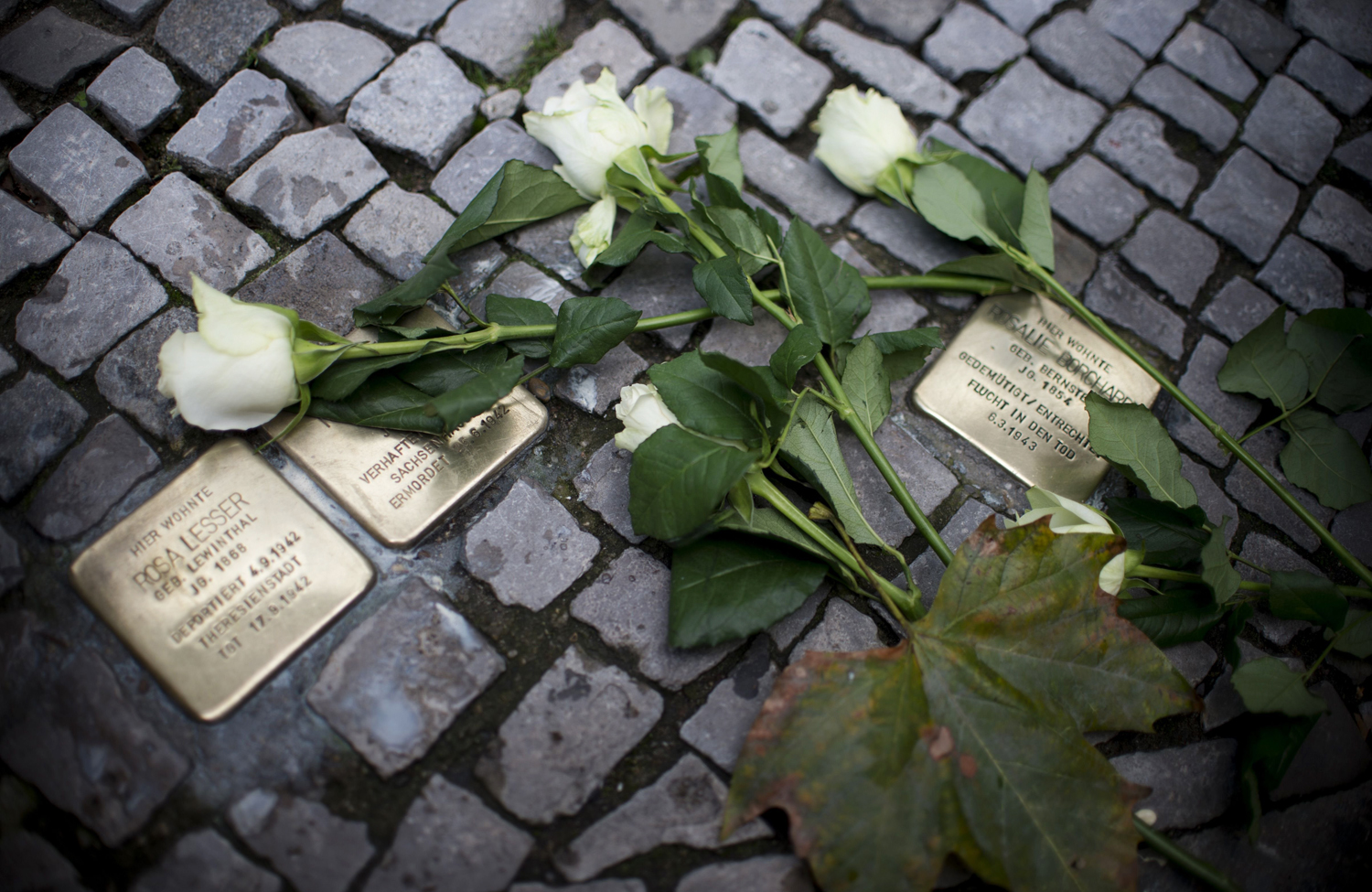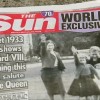The memory of Kristallnacht should alert us to the perils of indifference
written for Conservative Home, 14 November 2013

Roses lay on a Berlin “stolperstein” on the 75th anniversary of Kristallnacht. Johannes Eisele/AFP/Getty Images
When John Izbicki was an eight year-old boy in Berlin, he learned a lesson in divine justice. He decided that God exists because he watched an elderly woman, bent double with arthritis, split her head open on a sharp shard of broken glass. It’s an abhorrent image – John broke into a fit of vomiting at the sight of the frail woman’s blood. But the date was 9th November, 1938, and John had just watched the woman cheer on a Nazi gang destroying his parents’ shop, even sticking her head into the window to yell at the terrified couple: Juden Raus! Jews Out!
This past weekend was Remembrance Sunday. But it was also the 75th anniversary of Kristallnacht, the night of organised violence by the Nazi party which saw 30,000 Jews rounded up and sent to concentration camps, and 7,000 Jewish businesses seriously damaged. Most, like John’s parents’, were small family shops, burned to the ground, or left with smashed windows and goods. If we can put a date on the beginning of the Holocaust, it’s probably Kristallnacht – “the Night of Broken Glass”.
So on Sunday, like the rest of Britain, I was remembering. As The Spectator’s excellent leader suggests this week, it has become a commonplace to claim Britain has given up on war, but “remembering the second world war also allows us to remember perhaps the last time that an existential threat was justly responded to and evil ultimately triumphed over by this country. The recollection of that war is good for us.”
Westminster Abbey did double duty on Sunday. For most of the day, the hardworking clergy hosted services of remembrance for the families and comrades of those who died serving our country, including Lee Rigby, murdered for representing his country’s values. In the evening, they collaborated with rabbis from the West London Synagogue and Belsize Square Synagogue, to remember just why those values matter.
People queued for an hour beforehand for entry. The queue stretched round the corner and the whole length of the Abbey gardens, and many of those patiently waiting in the cold turned out to know each other through the refugee Jewish community. There they were, chatting about the lives their families had made in England. I particularly enjoyed hearing about the heyday of the amateur dramatics society at the Belsize Square Synagogue, though perhaps I should have been listening to the distinguished scientist explain his work on antibiotics. On the other side of the garden railings, servicemen and women paused at memorials dotted with poppies and crosses, most of them wearing medals, some marked by injuries, and all with expressions of a personally felt grief. Most had served in more recent wars, but if they’d looked over the railings, they’d still have seen a community of people who understand that war is often necessary, that not every conflict can be solved by talking.
We hear plenty about failures of the diplomatic approach in the 1930s, but we hear less about how it specifically failed to reduce the Holocaust. When John Izbicki told his story during Sunday’s event, what stuck with me was not the visceral image of an arthritic cutting herself in her fury, but the simplicity of her cry: “Jews Out”. If Kristallnacht had occurred in Eastern Europe, we’d recognize it more readily as a pogrom, an execution of ruthlessly planned violence against a settled Jewish community, with the aim of telling Jewish residents of a town to pack up and leave. Frequently, Russian pogroms were followed by town proclamations blaming Jews for the violence and banishing them.
And in 1938, the Nazi party still expressed its anti-Semitism by defining Jews as foreigners in their country, so if it could expel as many Jewish Germans or Austrians as possible, it wouldn’t have to murder them. At the Evian Conference in July 1938, Britain, American and Germany attempted to come to a solution of “the Jewish problem”, but the Western nations refused to open their borders. Perhaps they saw co-operation as facilitating Hitler’s cleansing-by-expulsion, but the alternative for German Jews was worse.
Hitler’s response was Kristallnacht – not only was the entire event planned from Munich, but the majority of Jews then taken to concentration camps were told they could be released if they provided proof of intent to leave the country. When Robert Smallbones, a British diplomat in Frankfurt, asked the Home Office what to do for these people, he was told that Britain couldn’t offer asylum – “the influx of Jews would cause great unemployment”. If that sounds eerily familiar, what’s worse is that the Home Office eventually allowed Smallbones to accept only Jews who undertook not to look for work, and to leave for America within a year: even today, asylum seekers are banned from working, leaving bureaucrats to redefine into obsolescence the word “destitute”.
But fundamentally, in Britain, we eventually did the right thing, if it took another year and the invasion of Poland to stand up to Germany. As Daniel Finkelstein noted a few months ago, we don’t always do so now (£). As I watched British servicemen walk alongside the children of Kristallnacht survivors, I was reminded of his response to the failed vote on Syria: “For me, saving innocent lives is in the national interest because it is wrapped up with what it means to be British.” I’ve become as tired as anybody else of our national obsession with Hitler. But as Little England threatens to turn its back on a dangerous world, remembering Kristallnacht suddenly seems more important than ever.






